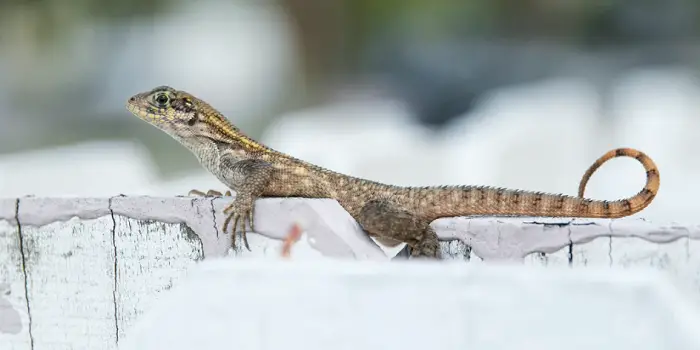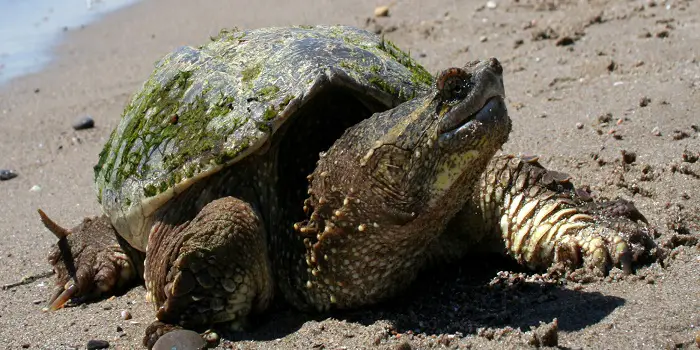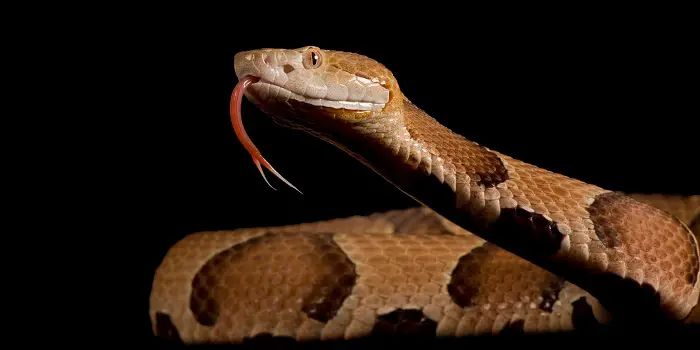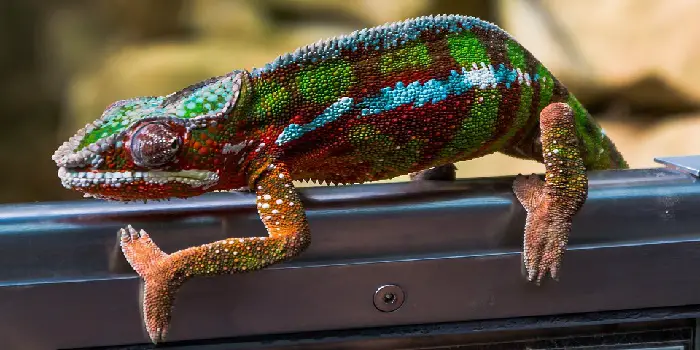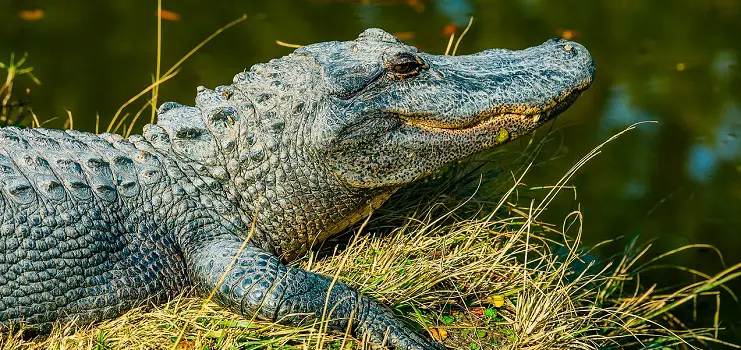
It is said that alligators have existed from prehistoric times and are one of the oldest beings on the earth.
When categorizing, you have largely two breeds- the ones living near rivers, lakes, and swaps and the others dwelling in the freshwater region.
An adult alligator is around 15 ft. long and weighs over 1000lbs.
However, the one found in Louisiana was mere 19inches long!
Alligators nesting in a nearby pond when growing giant may pose a real threat to your kids and pets – if they come near to the house.
It, therefore, is important to take proper steps to get rid of them as soon as possible.
Are Alligators Dangerous?
Alligators have about 75 teeth with extremely powerful jaws.
They grab their prey and roll them over and over again until they are drowned/dead.
With that said, a wild alligator may not be a threat in comparison to the one dwelling in your yard.
Though alligators don’t prey on humans, they don’t even disagree with this thought. They will definitely attack if they feel any threat.
Yes, they do attack and kill pets and humans. But, only in rare cases and usually, the attacks take place during late spring i.e., the mating season.
Other than this, if you own a lake, then swimming in it may not be a preferable option if alligators share the space.
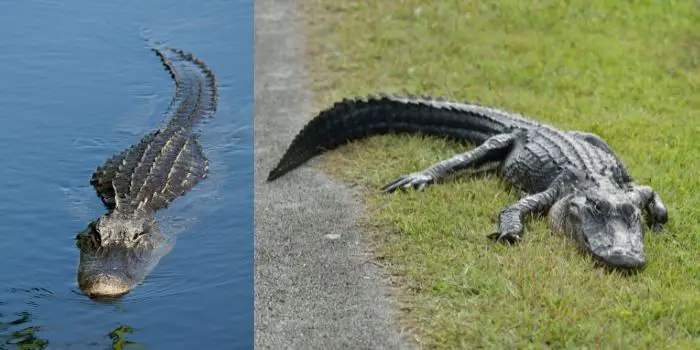
5 Tips to getting Rid of Alligators
As such you don’t have any registered repellent and toxic stuff to get rid of alligators from your property.
Even if there were, they are just temporary options to remove any predator from your property and, on second thought, may be hazardous to humans and pets.
You may, therefore, try these ways to get rid of them if you find one in your house.
1- Remove Leftovers
Alligators mostly wander and visit your place when they look for food and water.
There is an instance when they may also be looking for a better shelter.
So, the very first thing you need to make sure of is you don’t leave any food which alligators cherish outside.
You should also eliminate any garbage and leftovers.
When the place around is clean and tidy, chances are that an alligator will not be attracted.
2- Install a Strong Fence
If you live in areas like South Carolina, Florida, or Louisiana, chances are you will meet an alligator or a crocodile due to the climatic conditions they love.
Fencing your property with a well-built, sturdy fence is definitely one of the best ways to keep alligators off your property if you are likely to meet one and want to stay protected.
Some of the best fencing options you can try include:
- Chain link fence
- Single-strand electric fence
- Wood, aluminum, or concrete fence
- Thick and durable safety glass fencing
3- Put Up a Pool Enclosure
If you have a swimming pool at home, installing a pool enclosure or a pool cage is an effective way to keep alligators off your property.
Although it can be expensive to install for many, the benefits you get are worth your money.
Not only do these pool enclosures help secure your pool from gators, but they also help in keeping your pool cleaner and protected from harmful UV rays.
4- Try Natural Repellents
Although there is not any alligator repellent you will find in the stores, you can try different homemade repellents that can work to keep off alligators.
One of the best ways is mixing humane urine with ammonia and spraying this mixture on the areas where alligators may enter your property.
The smell of the mixture usually resembles the smell of predators, so it may deter the alligators.
However, the drawback of using this mixture is it smells terrible for humans and pets too.
Plus, the ammonia that you use can be hazardous and can cause severe injuries if used in higher quantities.
5- Try Alligator Bait Traps
Alligators easily get attracted to the bait.
So, one way to trap an alligator is by hooking bait.
Just implant a hook in a chicken or fish and hang it from a tree branch above the water.
Keep a height of 2 feet above the water.
Once the alligator comes for the bait, the hook will dig deep inside its stomach, and it will get pulled out of the water with the rope affixed to the hook.
However, this trap approach isn’t used now as it may injure or kill the alligator.
With regards to trapping an alligator, different states have different rules which citizens should follow.
Firstly, you need a license to trap an alligator on your own.
You may also have to team with the Department of Wildlife of your state and know the regulations.
Try Self-locking Snare Instead…
This is in fact one of the most recommended ways to trap an alligator.
Just put the bait in a self-locking snare at someplace where the alligator usually visits and looks out for a feed.
As soon as the alligator sticks its head to snatch its prey, the trigger is set off, and it gets captured.
Such traps aren’t just tough to set up, but they are also dangerous.
You may not be aware of the timing when the alligator visits and leaves the area.
Hence, you should leave it to the hands of experts.
Note:
Never attempt to trap an alligator inside water single-handed, regardless of how much experience you have in trapping them.
Even if you are a pro, you would still need the help of at least two people.
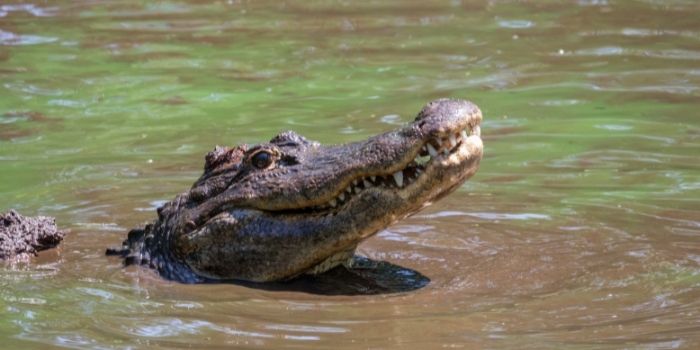
Tips to Keep Alligators Out of Pond
If there are alligators in your pond, you should be extremely cautious – they could be dangerous.
One wrong move, and they will pack a bite off you.
Even losing a limb to a gator is pretty easy, especially for your house pets and kids. Hence it is very important to take this issue seriously.
You don’t have any safe and sound method to get a gator out of your pond unless you hire a professional.
Professionals use different trapping approaches but not meat on the hook, as this approach may kill or hurt the gator.
After the alligator has been moved, you can try other remedies to keep them away from your pond.
If your pond is small, for example, you can get it fenced.
In most cases, you will not need fences taller than 4-foot as alligators can’t climb them easily.
For fencing, a pond installing a concrete fence with concrete footers is the best option.
You should make sure to bury the fence about 1.5 – 2 feet into the ground. This will prevent alligators from digging under it.
Tips to Keep Alligators Away from Your Yard
If alligators are in your yard and you want to evacuate the area, then take complete caution first.
Even at some point, if you stand head on head with an alligator, then ensure that your pet is on a leash, and never ever you touch it.
If the gator hisses at you, then take it as a warning that it considers your presence as an invasion of its territory, so try and move back gradually.
In rare cases, it has been seen that alligators sprint at 35mph for short runs.
So try and keep your yard picked up so that these guys don’t trouble you a lot.
One of the most important things you should always do is clean after you have had a BBQ and never leave any kind of alligator-friendly food outside.
Another great idea to keep alligators away from your yard is to get a fence installed.
Usually, fencing is the most recommended option to prevent alligators’ entrance, especially when you own a backyard on your property.
For fencing in your yard or a garden installing wooden or chain link fences can be a good option.
Make sure you install a fence that is at least 5 feet high.
Plus, make the top of it tilted outwards at a 45-degree angle.
You can also try reinforcing the top of the chain-link fence with barbed wires for additional security.
This way, you can prevent the gators from climbing and reaching the top of the fence.
Always keep in mind that these animals are truly dangerous and shouldn’t be handled by someone normal but only by experts, either on land or in water.
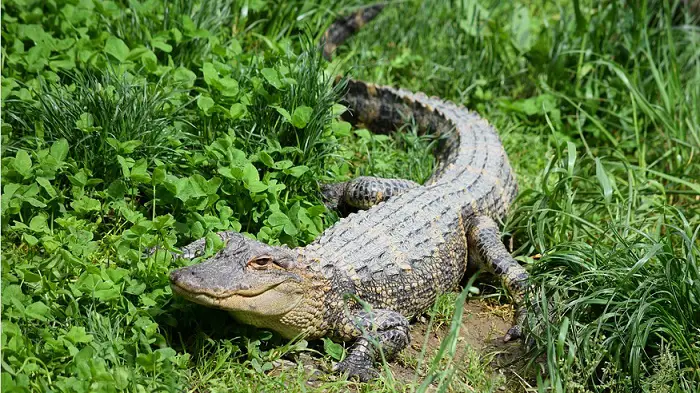
Tips to Stop Alligators Coming from Lakes or Rivers
Alligators are common in most parts of the country and it especially applies to rivers and lakes.
The only reason why an alligator will leave its habitat and come to your lake is that there is a good source of food available, and once it gets removed, then the alligators may never come back.
It could be the presence of other animals such as muskrats or beavers which attract gators to your property.
If you remove the prey, the alligators will move elsewhere in search of their prey.
In addition, if you notice an alligator in a river or a lake near your property, you should never go there for swimming.
They may be agile on land, but inside water as well as by the shore, they are incredibly dangerous.
As they don’t prefer being around people, there are good chances that you will not see them the next day.
However, if the alligator resides in that area, then it should be removed and kept somewhere safer.
But, ensure that the trapping and placement procedure is only done by the hands of experts as they are truly one of the most dangerous reptiles on earth.
It has been seen that experts usually remove the prey and don’t use a net to trap alligators.
The simple reason behind it is that they can easily break the net and move out.
If the problem is serious, you can even try installing a modern electric fence around your property.
It comes with an approved energizer and may prove beneficial in stopping alligators and crocodiles from coming.
Note:
Before you install any physical barrier around your property, it’s important to check if it’s allowed or whether you need a building permit for it.
Alligator vs. Crocodile: What are the Real Differences?
Do you know what the difference between an alligator and a crocodile is?
Although there are not many differences between the two (since these two reptile groups are close relatives), you should know about the physical similarities and the differences they carry.
This will help you know whether you encountered a crocodile or an alligator in your yard.
The below video will helpfully help in identifying these two common animals.
Other Related Questions:
Why are alligators so aggressive?
Alligators are found to become more aggressive in the warmer weather (April to late June), which is mostly their mating season.
This is the time you can visibly locate them near the shores of water bodies – basking in the sun and regulating the temperature of their body.
Warming their body also helps increase the reptile’s metabolism and desire for preying.
What animals can kill an alligator?
While there are not many alligators predators, these reptiles have a few natural enemies of their own.
Bigger cats (such as leopards or jaguars) and huge serpents (such as anacondas and pythons) are known to attack, kill and eat the alligators.
What are the different types of alligators?
Basically, there are two types of alligators found. These are the Chinese alligator and the American alligator.
While American alligators, as the name suggests, are found in the United States of America, Chinese alligators are found in the country of China.
Also, the Chinese alligators are comparatively smaller in size compared to the American alligators.
How fast can an alligator run on dry land?
While alligators can travel very quickly in the water, they are slow at moving on land. Also, they do not like to run long distances.
This is generally due to their heavy body and slow metabolism.
Despite their bulky weight, they can many times take short bursts of speed exceeding 30 miles per hour.
This is when they are trying to prey or want to escape from the predator.
What to do if you are chased or attacked by an alligator?
The best is to run away as soon as you see an alligator attacking or coming near you.
When trying to escape, make sure you do not run in a zig-zag pattern but in a straight line which makes you run faster.
If it’s too late to escape for you, you will need to fight back by attacking the sensitive areas of an alligator-like snout and eyes.
You can also hold its mouth shut tight as they have the least muscle power when opening its jaws. All their jaw power lies in the downside.
The Conclusion
If you have a water body near your property and the area is known for alligators, then there are high chances that you will see these large beasts somewhere around your home.
Alligators find it very homely inside water as well as by the shore.
So, if you have noticed a gator inside water, then stay away from it.
You may have different ideas and thoughts about trapping an alligator on your own, but unless you hold some experience in this field, you shouldn’t ever attempt it.
The best shot to keep them away from your river, pond, or backyard is not to leave any food outside and to fence your area so that they cannot enter inside your home.
In the end, removing gators (big or small) can be dangerous and should be done by professionals.
Share the post "How to Get Rid of Alligators in Your Pond and Backyard?"

Welcome to ProShieldPest.com. I am Tina Jones. I have been working as a pest removal professional in Winslow, Arizona lately. At present, I love to spend my time with my family as a retiree.
Here I share all my knowledge and experiences to help people understand better how they can stop pests at their homes without actually killing them. Hopefully, the information you will find here will help in safeguarding your home! You can check more about me here.

